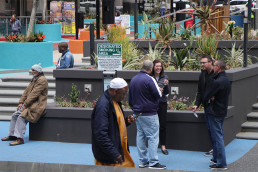
A Future Of Corporate Privately Managed Public Spaces
The Possibilities of Corporate PMPS in Post-Colonial African Cities
Abstract
In a climate of urban insecurity, Privately Managed Public Spaces (PMPS) in African financial centres reside at the threshold where the ‘fortress city’ and the ‘survival city’ meet. Colonialism (and apartheid) denied both common rights and rights to the commons. Public life was confined to spaces which could be controlled and policed on the state’s terms. Yet, few urbanists have questioned the assumption that public space serves to engender social cohesion, inclusivity, and civic culture. In the post-colonial/apartheid African city, crime, dilapidation and appropriation of public space by the ‘survival city’ means that few spaces are truly public.
Those with means have withdrawn into the interiority of the private realm whilst public space is increasingly abandoned, left in a state of anomie, or subjected to non-state forms of securitisation or governance. Proponents suggest that PMPS can become well –used amenities for the city, enhance the quality of the workspace for employees, act as foyers for surrounding property owners, add value to real estate, and /or be central to sustainable urban regeneration efforts. Critics accuse PMPS of producing neoliberal exclusive elitist spaces which exacerbate urban fragmentation and marginalize the shifting urban other.
However, research suggests that PMPS have not displaced the inquisitiveness, enchantment and regard for others nostalgically reserved for public space. Studies on PMPS in urban Africa have focused on five types: the gated community, the shopping mall, the casino, CIDS, and the ‘new urbanist mixed-use’ enclave. Corporates are involved in a variety of scales of PMPS, which as a collective, have yet to receive due critical attention. To address this gap, this paper will present qualitative research undertaken at case-study sites in Johannesburg and Nairobi, to explore if and how corporate PMPS encourage positive encounters and foster a sense of shared space or if they merely reify existing urban divisions.
PROJECT TYPE
Research Presentation
LOCATION
Gauteng
YEAR
2019
COLLABORATORS
Research Lead: Dr. Britt Baillie
Margeaux Adams
Julia Carew
Mark Kiarie
Mikara Naidoo
PHOTOGRAPHY
Sally Gaule
Assistant: Aheesh Singh
GRAPHICS
Fred Swart (Maps)
Liesl Niemand
DIGITAL MAPPING
Steven Moore
German Bodenbender
Share
The scope of the orginal Abstract conceptualised in 2018 has shifted from Corporately Privately Owned Public Spaces to Corporately Managed Public Spaces based on the intial research insights.

forming part of “a dual city and a dual nation, diverse urban worlds existing side by side in the same geographical space” (Bremner 2016 PAGE, cf).
Question (2018)
Can corporate POPSs in African financial centres become reimagined as welcoming shared spaces?
Abstract
In a climate of urban insecurity, Privately Owned Public Spaces (POPS) in African financial centres reside at the threshold where the ‘fortress city’ and the ‘survival city’ meet. Colonialism and apartheid denied both common rights and rights to the commons Public life was confined to spaces which could be controlled and policed on the state’s terms. Yet, urbanists have not generally questioned the assumption that public space serves to engender social cohesion, inclusivity, and civic culture. In the post-colonial/apartheid African city, crime, dilapidation and appropriation of public space by the ‘survival city’ means that few spaces are truly public. Those with means have withdrawn into the interiority of the private realm whilst public space is increasingly abandoned, left in a state of anomie, or subjected to non-state forms of securitisation or governance. Building more robust and welcoming interfaces between public and private space is therefore a priority. Research from non-African contexts suggests that POPS can become well-used amenities for the city, enhance the quality of the workspace for employees, act as foyers for their corporate owners, add value to real estate, and/or be central to sustainable urban regeneration efforts. However, research is needed to identify how POPS can better respond to the everyday realities and needs of African cities.
Opponents of enclosure, accuse POPS of producing exclusive elitist spaces which exacerbate urban fragmentation and marginalise the shifting urban other. However, research conducted in other contexts suggests that POPS have not displaced the inquisitiveness, enchantment and regard for others nostalgically reserved for public space. Studies on POPS in urban Africa have focused on four types: the gated community, the shopping mall, the casino, and the ‘new urbanist mixed-use’ enclave. Corporate POPS have yet to receive due critical attention. To address this gap, the proposed qualitative research will be undertaken at three case-study sites, to explore if and how the design of African urban corporate POPS does or can encourage positive encounter and foster a sense of welcome.
